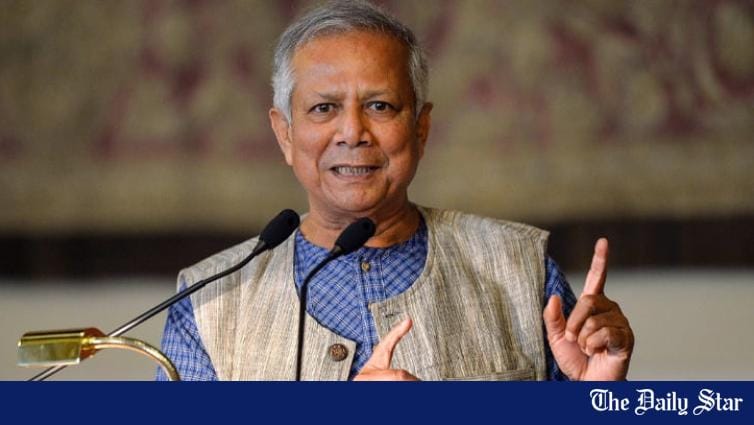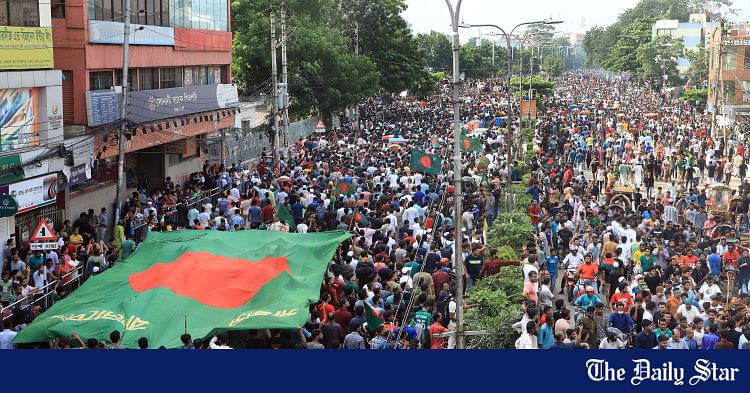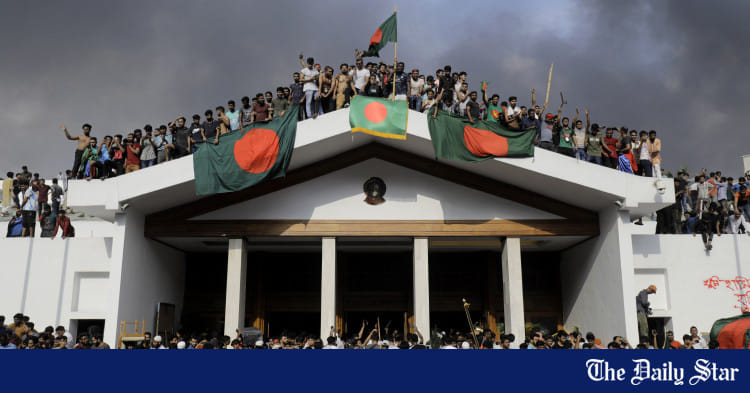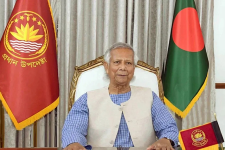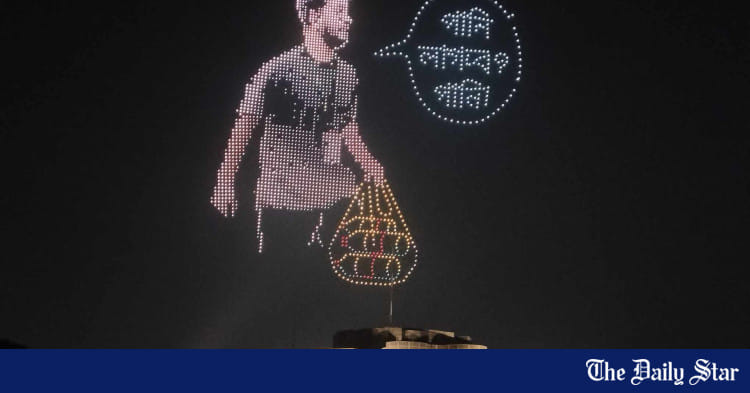A sample of proclamation of July-August 2024 revolution
Khawaza Main Uddin
Published: 19 Apr 2025, 21: 33
Only eight months into the political changeover that ended the rule of a fascist regime on 5 August 2024, the stakeholders inclusive of some political elements and a section of citizens have become confused about the post-revolutionary moves and actions required for building a new, democratic Bangladesh.
This is precisely because, let’s admit, there had been no codified objectives or pre-political concept of the revolution despite the greatness of people’s resistance movement and great expectations spelt out from time to time and sometimes haphazardly. In fact, missing was the ‘Proclamation of the Revolution’, which, in historic instances elsewhere, was found to have been prepared and announced by the leading party or the paramount leader.
In our case, the July-August 2024 revolution took place all of a sudden and without one particular political party at its helm, but of course as consequence of denial of democratic rights over the years. The context of this revolution was set bit by bit with coercive and corrupt measures and abuse of power by the Sheikh Hasina regime and obviously due to the prolonged popular anger, finally triggered by the bloodshed – killing of more than 1,000 innocent people and injuries to over 20,000 in three weeks.
The ‘Students Against Discrimination’, the umbrella organisation of the youths, which started the protest against the quota system in civil service and coordinated with different stakeholders for carrying forward the movement with suitable, innovative programmes, and major political organisations including Bangladesh Nationalist Party and Islamic political forces, that extended their support by sending their activists and supporters to the movement for political change, have not yet come up with such a proclamation or manifesto as guiding principles to transform the people’s aspirations into actionable reality.
The rotten system of governance unleashed by Hasina’s Bangladesh Awami League collapsed like a house of cards following the revolution joined by various socio-political forces and cross section of people.
Installed with a definitively revolutionary mandate, the interim administration of Professor Muhammad Yunus and his Council of Advisers have initiated to restore peace and order, carry out routine official works, rebuild democratic institutions and the economy and bring necessary reforms for building a truly democratic republic for current and future generations.
In order to ensure and protect freedom and welfare of people, all three branches of the state – executive, legislature and judiciary – shall be empowered and allowed to function smoothly with checks and balances in power and authority and the fourth estate, the intelligentsia and citizens’ conscientious voice shall act independently to help ensure proper management of the state affairs and smooth functioning of public institutions.
However, a clear sense of direction from the revolution towards the next courses of action is yet to be made in absence of documented objectives for determining and implementing the tasks of present and future governments.
In such a situation, may I offer a sample proclamation as food for thought to reach certain understanding, overcoming the deadlock over preparaton of a proclamation. Since this is the personal view of this author, anyone can differ, criticise or even dismiss this proposition. The aim of this initiative is to generate constructive public debates that often lead to positive movements in society and political arena.
So, here is the proposed draft ‘Proclamation of the July-August 2024 Revolution’:
“Born in a country inherited from our forefathers, we have dreamt of having better life, peaceful and vibrant society, a just economic order and a fair justice delivery system as well as functional democracy. Generations after generations have strived for freeing them from various curses and misrule and attaining progress in building a true republic.
Bangladesh was liberated in 1971 to get rid of deprivation and subjugation of the people by foreign rulers once and for all. Unfortunately, the country has once again fallen into the hole of dictatorial rule enforced by one party, Bangladesh Awami League, first in 1972-1975 and then during the 2009-2024 period. Ultimately, the common people have to revolt against the illegitimate, anti-people, anti-state regime laying down many lives to make sure that they are not the slaves of rulers and their oligarchs, nor are they aliens in their motherland. Through their participation in the movement they have indicated their longing for change in governance culture and state structure and of tolerant leadership and harmonious society, as may be expressed in the following manner:
Whereas the people of Bangladesh have suffered a serious setback for the fascist rule backed by its collaborators at home and abroad, we hereby assert the right to self-determination and pursuit of individual and collective wellbeing in our national life.
The revolution unequivocally calls for building a new Bangladesh republic. It is being categorically stated here that this country belongs to the people and the people are committed to serving the country with dignity and integrity.
For the Bangladesh people have been deliberately made victims of genocide, political witch-hunting, extrajudicial killing, enforced disappearance and arbitrary detention, in connivance of local authorities and foreign players, and the country’s sovereignty was sacrificed for prolonging a party leader’s stay in power, the new republic shall put an end to the culture of impunity and give priority to safety and security of the people alongside collective endeavours to promote national interest and bolster security of the state.
As the people of this delta had not been treated fairly and equally, and not been provided with social justice during the colonial rule and major part of post-colonial period, particularly in the past one and a half decades, and as the government as representative entity of the state, had remained oppressive and repressive, the new generation of Bangladeshis has been pledge-bound to make the state sensitive to humans, rewriting and amending the Constitution, laws, rules and regulations and work for peace and justice for all citizens in all sectors.
Given the arrogance of power shown by most incumbents and slavery of money and power and disparity created by the corrupt and undemocratic regime, it is essential to offer all of us, especially the commoners, salvation from all such ills and evils.
Since Bangladesh came into being with democratic aspiration and pluralistic political views, and the people have time and again fought for the cause of democracy as the system of governance, ballot shall be considered as the acceptable means of electing leaders and there shall be space, scope and system for practicing democracy, through debates and rational arguments, for example, in socio-political life every day.
While the state shall guarantee liberty of individuals and encourage their ambition to succeed, the citizens, too, should act responsibly, taking proper ownership of the state and upholding the spirit to protect independence and sovereignty of the state.
In the new republic, the right of the people to properties and services and access to justice and equitable distribution of resources shall be established socially, legally and politically.
Whereas ‘power tends to corrupt’ as we have experienced of late, effective institutional arrangements must be put in place to stop corruption and its sources; office bearers and political leaders shall advocate and maintain anti-corruption stance, transparency and accountability in society and statecraft; and the citizens shall remain vigilant and raise voice as and when necessary.
Whereas the fascist regime has silenced the people by suppressing their voting rights, politicising the administration and the judiciary and muzzling the media to perpetuate its rule and plunder national resources, those who oppose such misdeeds and support the ongoing revolution resolve that there shall be unreserved guarantee within the state to speak the truth in all affairs and spheres of life without any ambiguity and barriers.
In congruity with the demands, needs and expectations of the people in a new century, the state shall make arrangements for flourishing talent and potential of the citizens. The state shall support the youth to grow and utilise their capacity and power in greater purposes.
Thus we have been confident that Bangladesh shall emerge as a truly independent and dignified nation, among the comity of nations, that would believe in inter-state and international relations based on sovereign equality, adherence to universal laws and rules, equity in global system and partnership and amity with other countries.
This revolution promises building of a developed and happy nation in all respect and accordingly, the state shall provide the citizens with better healthcare facilities, educational opportunities and healthy living space for all.
In order to ensure and protect freedom and welfare of people, all three branches of the state – executive, legislature and judiciary – shall be empowered and allowed to function smoothly with checks and balances in power and authority and the fourth estate, the intelligentsia and citizens’ conscientious voice shall act independently to help ensure proper management of the state affairs and smooth functioning of public institutions.
Furthermore, the living generations respect the authority of the future ones and maintain flexibility to bringing necessary changes in and amendment to the system of the state, however, leaving the scope for taking today’s accomplishments as legacy and blessings for our posterity.”
*Khawaza Main Uddin is a journalist.


